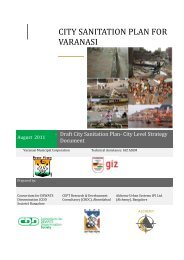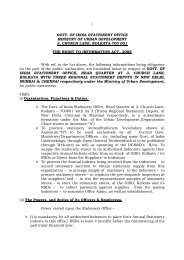MINUTES OF 4th MEETING OF THE PROJECT PLATINUM ...
MINUTES OF 4th MEETING OF THE PROJECT PLATINUM ...
MINUTES OF 4th MEETING OF THE PROJECT PLATINUM ...
Create successful ePaper yourself
Turn your PDF publications into a flip-book with our unique Google optimized e-Paper software.
the complex political composition in Peru government. Eventually a legal and<br />
institutional solution to this problem was initiated in 1996 through C<strong>OF</strong>OPRI<br />
7. He said that the institutional changes entailed placing a sector of urban population under<br />
state protection and incorporating informal property rights into the formal economy. The<br />
Urban Property Registry with nationwide scope was the most essential part of the reform<br />
and it was created with the purpose of registering the deeds originating from the<br />
formalization of property carried out by C<strong>OF</strong>OPRI. This public registry had simplified<br />
procedures for registration and publication of registry information and used modern<br />
technology and also aimed at creating a geo-referenced cadastral system. He highlighted<br />
the importance of registry since individual level data has to be maintained and such data<br />
should have both the physical reality as well as the ownership details of the property. He<br />
also said that it’s better to formalize first and then create the cadastre as in doing vice<br />
versa, there is a greater chance of committing errors and by formalizing, cadastres will be<br />
eventually created over time<br />
8. He said initially it’s only a basic cadastre and then by correcting the errors, complete<br />
integrated cadastre is created. He said that municipalities weren’t capable institutionally<br />
to undertake this reform. Mr Cesar added that municipalities don’t have enough<br />
technological expertise to undertake surveys and create cadasters<br />
9. Ms Swati pointed that this type of mapping is essential for the work that HUPA and<br />
Karnataka Directorate of Municipal Administration, are doing for slum mapping. She also<br />
highlighted the difference that as compared to what <strong>PLATINUM</strong> is proposing, Peru did<br />
the surveys later but formalization first and hence established the rights first. Mr Gonzalo<br />
said that this initial process of establishing rights was called diagnostics. The process<br />
followed hence was: diagnose the informality; then integral formalization; and finally<br />
individual formalization. Within diagnostics phase, information was gathered widely<br />
from various government offices and landholders and then diagnostic cards as well as<br />
maps were created<br />
10. Ms. Swati Ramanathan also talked about SUNARP that it is the registration department<br />
similar to the Stamps & Registration dept. in India and C<strong>OF</strong>OPRI is mostly about the<br />
formalization whereas SUNARP is about registration and has to work closely with<br />
C<strong>OF</strong>OPRI so as to not have conflicting records. However during the first phase of<br />
diagnostics, no registration is done with the SUNARP and is done only in later stages<br />
11. Mr Gonzalo explained in detail the process of formalization and its outcomes and said<br />
that it is a continuous process that aims to bring urban informal population closer to<br />
central government, integrate them into the formal economy and facilitate provision of<br />
certain basic urban services such as water and electricity to such human settlements,<br />
provide possibility to access to credit and foremost, allow the legal right to those who<br />
deserve it. In terms of the numbers, he said that in 2006, about 2 million lots were still left<br />
in Peru to be diagnosed and formalized. Since 1996, about 1.5 million were already<br />
diagnosed though they not all were formalized. Knowing such a number allows and helps<br />
2
















